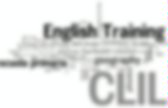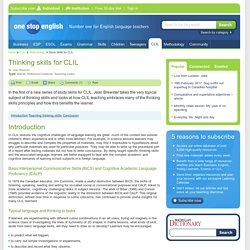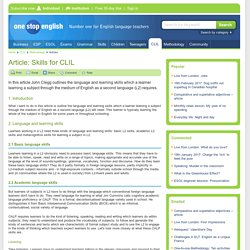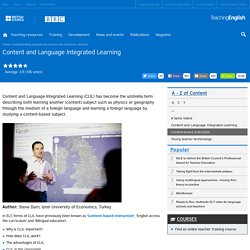

ESEMPI. Coyle clil planningtool kit. Peer review grid Techno CLIL. Planning a CLIL lesson. Oliver Meyers CLIL pyramid(1) CLIL links - A trip to CLIL. Surfing the Net. Quaderno n. 18. Quaderno n. 14. CLIL Magazine Spring 2016 by Patrick de Boer. Thinking skills for CLIL. By Jean Brewster In the first of a new series of study skills for CLIL, Jean Brewster takes the very topical subject of thinking skills and looks at how CLIL teaching embraces many of the thinking skills principles and how this benefits the learner.

In CLIL lessons the cognitive challenges of language learning are great; much of the content lies outside children's direct experience and is often more abstract. For example, in science lessons learners may struggle to describe and compare the properties of materials, may find it impossible to hypothesize about why particular materials are used for particular purposes. They may be able to write up the procedural part of a report after testing materials but not how to write conclusions. By being taught specific thinking skills and the associated language, learners are better equipped to deal with the complex academic and cognitive demands of learning school subjects in a foreign language. Typical language and thinking in tasks September 2009. Article: Skills for CLIL. In this article John Clegg outlines the language and learning skills which a learner learning a subject through the medium of English as a second language (L2) requires. 1.

Introduction What I want to do in this article is outline the language and learning skills which a learner learning a subject through the medium of English as a second language (L2) will need. This learner is typically learning the whole of the subject in English for some years or throughout schooling. 2. Learners working in a L2 need three kinds of language and learning skills: basic L2 skills, academic L2 skills and metacognitive skills for learning a subject in L2. 2.1 Basic language skills Learners learning in a L2 obviously need to possess basic language skills. 2.2 Academic language skills But learners of subjects in L2 have to do things with the language which conventional foreign language learners don't have to do. Listening Take listening. Reading Let's turn to reading.
Writing Talking Finally they have to talk. 3. Content and Language Integrated Learning. In ELT, forms of CLIL have previously been known as 'Content-based instruction', 'English across the curriculum' and 'Bilingual education'.

Why is CLIL important? How does CLIL work? The advantages of CLILCLIL in the classroomThe future of CLILWhere is CLIL happening? Why is CLIL important? With the expansion of the European Union, diversity of language and the need for communication are seen as central issues. Even with English as the main language, other languages are unlikely to disappear. How does CLIL work? Knowledge of the language becomes the means of learning contentLanguage is integrated into the broad curriculumLearning is improved through increased motivation and the study of natural language seen in context.
CLIL Teacher Magazine.